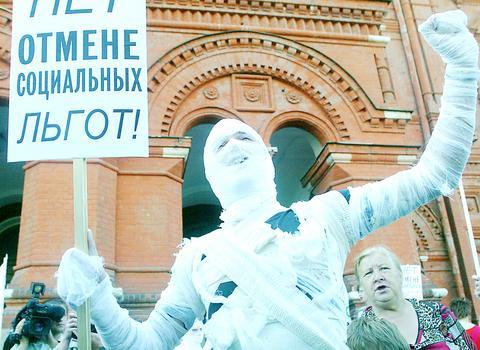A bill to end an array of Soviet-era benefits for the elderly and disabled, including free transportation and medicine, was approved by the lower house of Russia's parliament yesterday, making the measure almost certain to become law.
The government-backed legislation was approved 309-118 in the 450-seat State Duma, which is dominated by the pro-Kremlin United Russia party. Communist and nationalist legislators vehemently opposed it.

PHOTO: REUTERS
"This law contradicts the constitution and is against the people," said Communist lawmaker Valentin Romanov.
A small group of elderly protesters stood across the street from the Duma building, but the gathering was far smaller than large protests that had gathered in weeks against the legislation.
With the Duma's approval, the measure now goes to the Federation Council, the upper chamber that is seen as largely a rubber-stamp mechanism for the Kremlin. The council is expected to approve the bill on Sunday, after which it would be presented to President Vladimir Putin to be signed into law.
The measure calls for ending many of the long-standing benefits received by tens of millions of Russia's most vulnerable citizens, including the elderly, the disabled and World War II veterans, and to replace them with cash payments.
The government says the move to strip many of the Soviet-era benefits is a key step toward streamlining a lumbering bureaucracy and will be a boon to many. But recipients are outraged at what they see as abandonment by the state they served.
"The benefits have been given by the state to those who have deserved them by labor or heroic deeds and taking them away is like spitting in people's faces," said Valentina Ivanova, 67, a demonstrator.
"What they are doing is putting us in our coffins alive," she said.
The bill affects an estimated 30 million people, who constitute Russia's most vulnerable population segments.
It eliminates free access to urban transportation, free home phone use for local calls, free provision of artificial limbs, job guarantees for the disabled and, for many, free medicine. In return, they'll get monthly cash payments ranging from 1,550 rubles (US$53) down to 150 rubles (US$5.10).
Proponents of the bill say substituting cash for benefits will make aid more accurately targeted -- arguing, for example, that public transportation is scarce in rural areas.
But opponents have a raft of arguments: cash payments are vulnerable to inflation, the notoriously inefficient Russian authorities may fall months behind in the payments and the cash payments won't be enough to make up for the losses.
Under a so-called "social package" provision, medicine and some other benefits such as suburban train transport will be provided. But recipients of the social package will have 450 rubles (US$15.50) a month deducted from their new compensation payments; it is also not clear whether all the medicines currently provided free would be included in the package.

Kehinde Sanni spends his days smoothing out dents and repainting scratched bumpers in a modest autobody shop in Lagos. He has never left Nigeria, yet he speaks glowingly of Burkina Faso military leader Ibrahim Traore. “Nigeria needs someone like Ibrahim Traore of Burkina Faso. He is doing well for his country,” Sanni said. His admiration is shaped by a steady stream of viral videos, memes and social media posts — many misleading or outright false — portraying Traore as a fearless reformer who defied Western powers and reclaimed his country’s dignity. The Burkinabe strongman swept into power following a coup in September 2022

‘FRAGMENTING’: British politics have for a long time been dominated by the Labor Party and the Tories, but polls suggest that Reform now poses a significant challenge Hard-right upstarts Reform UK snatched a parliamentary seat from British Prime Minister Keir Starmer’s Labor Party yesterday in local elections that dealt a blow to the UK’s two establishment parties. Reform, led by anti-immigrant firebrand Nigel Farage, won the by-election in Runcorn and Helsby in northwest England by just six votes, as it picked up gains in other localities, including one mayoralty. The group’s strong showing continues momentum it built up at last year’s general election and appears to confirm a trend that the UK is entering an era of multi-party politics. “For the movement, for the party it’s a very, very big

ENTERTAINMENT: Rio officials have a history of organizing massive concerts on Copacabana Beach, with Madonna’s show drawing about 1.6 million fans last year Lady Gaga on Saturday night gave a free concert in front of 2 million fans who poured onto Copacabana Beach in Rio de Janeiro for the biggest show of her career. “Tonight, we’re making history... Thank you for making history with me,” Lady Gaga told a screaming crowd. The Mother Monster, as she is known, started the show at about 10:10pm local time with her 2011 song Bloody Mary. Cries of joy rose from the tightly packed fans who sang and danced shoulder-to-shoulder on the vast stretch of sand. Concert organizers said 2.1 million people attended the show. Lady Gaga

SUPPORT: The Australian prime minister promised to back Kyiv against Russia’s invasion, saying: ‘That’s my government’s position. It was yesterday. It still is’ Left-leaning Australian Prime Minister Anthony Albanese yesterday basked in his landslide election win, promising a “disciplined, orderly” government to confront cost-of-living pain and tariff turmoil. People clapped as the 62-year-old and his fiancee, Jodie Haydon, who visited his old inner Sydney haunt, Cafe Italia, surrounded by a crowd of jostling photographers and journalists. Albanese’s Labor Party is on course to win at least 83 seats in the 150-member parliament, partial results showed. Opposition leader Peter Dutton’s conservative Liberal-National coalition had just 38 seats, and other parties 12. Another 17 seats were still in doubt. “We will be a disciplined, orderly